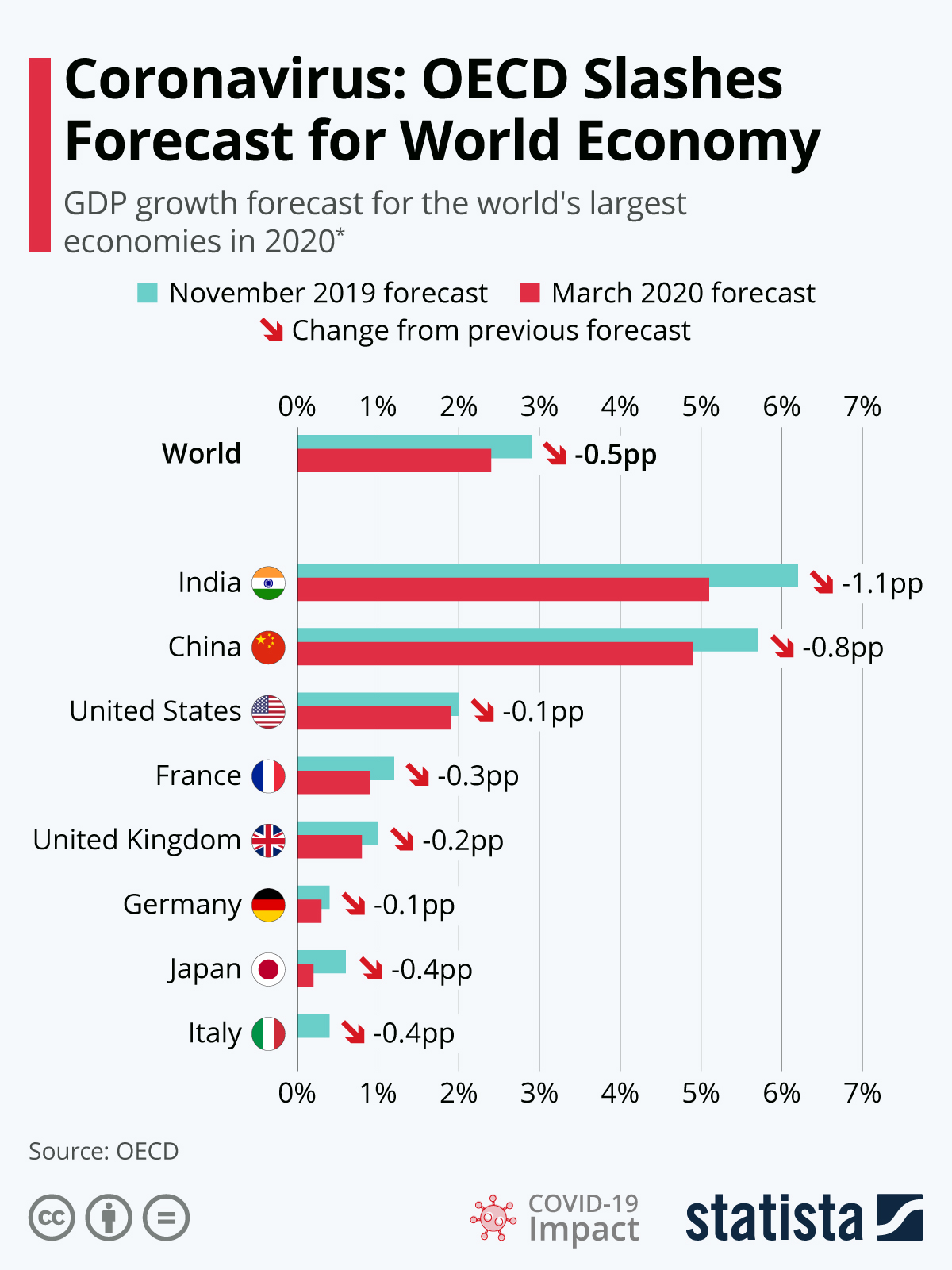While it’s too early to gauge the full economic fallout of the coronavirus outbreak, the OECD has already slashed its growth forecast for the world economy as the virus continues to spread outside of China. In its latest Interim Economic Assessment Report, the organization expects the impact of the COVID-19 outbreak to be severe, resulting in a 0.5 percentage point downward revision of its forecast for global GDP growth in 2020.
The OECD now expects the world economy to grow by 2.4 percent this year, down from its November 2019 estimate of 2.9 percent. That would be the lowest level of economic expansion since the end of the financial crisis, and possibly the trough of the current slowdown, depending on how long the current crisis persists and how quickly China’s economy can return to normality. Unsurprisingly, the epicenter of the outbreak is expected to be heavily affected by the epidemic. The OECD slashed its growth forecast for China from 5.7 to 4.9 percent, citing restrictions on the movement of people, goods and services as well as containment measures such factory closures as drivers of a sharp decline in domestic demand and manufacturing output.
The rest of the world isn’t shielded from the virus’ impact, however, as business travel and tourism are affected and many companies are facing supply chain disruptions due to their reliance on China. In case the impact on advanced economies turns out to be as severe as the disruptions suffered by China, the OECD warns that global growth could even drop to 1.5 percent in 2020, nearly half the rate originally projected.
The following chart shows the latest growth projections for the world’s largest economies, as well as the previous forecast dating back to November 2019.
#всё_подорожает, #но_у_нас
Обвал цен на нефть на мировых рынках никак не должен сказаться на стоимости бензина в России, заявил замминистра финансов РФ Алексей Сазонов.
"Я не думаю, что будет снижение цен на бензин. Но расти они не должны, это точно", - ответил на вопрос журналиста о возможном изменении стоимости топлива Сазонов, чьи слова приводит ТАСС.
Ранее министр энергетики Александр Новак объяснял, что в налоговой системе России предусмотрен специальный механизм, который нивелирует влияние изменения цен на нефть на мировых рынках на стоимость топлива на внутреннем рынке.
Из-за срыва сделки ОПЕК+ на прошлой неделе началось падение цен на нефть. Минимальные цены были отмечены в понедельник - 31 доллар за баррель, после корректировки к утру среды котировки вернулись к отметке 38 долларов за условную бочку.
The OECD now expects the world economy to grow by 2.4 percent this year, down from its November 2019 estimate of 2.9 percent. That would be the lowest level of economic expansion since the end of the financial crisis, and possibly the trough of the current slowdown, depending on how long the current crisis persists and how quickly China’s economy can return to normality. Unsurprisingly, the epicenter of the outbreak is expected to be heavily affected by the epidemic. The OECD slashed its growth forecast for China from 5.7 to 4.9 percent, citing restrictions on the movement of people, goods and services as well as containment measures such factory closures as drivers of a sharp decline in domestic demand and manufacturing output.
The rest of the world isn’t shielded from the virus’ impact, however, as business travel and tourism are affected and many companies are facing supply chain disruptions due to their reliance on China. In case the impact on advanced economies turns out to be as severe as the disruptions suffered by China, the OECD warns that global growth could even drop to 1.5 percent in 2020, nearly half the rate originally projected.
The following chart shows the latest growth projections for the world’s largest economies, as well as the previous forecast dating back to November 2019.
#всё_подорожает, #но_у_нас
#всё_подешевеет, #но_у_них
#кто_стырит_дельту
Обвал цен на нефть на мировых рынках никак не должен сказаться на стоимости бензина в России, заявил замминистра финансов РФ Алексей Сазонов.
"Я не думаю, что будет снижение цен на бензин. Но расти они не должны, это точно", - ответил на вопрос журналиста о возможном изменении стоимости топлива Сазонов, чьи слова приводит ТАСС.
Ранее министр энергетики Александр Новак объяснял, что в налоговой системе России предусмотрен специальный механизм, который нивелирует влияние изменения цен на нефть на мировых рынках на стоимость топлива на внутреннем рынке.
Из-за срыва сделки ОПЕК+ на прошлой неделе началось падение цен на нефть. Минимальные цены были отмечены в понедельник - 31 доллар за баррель, после корректировки к утру среды котировки вернулись к отметке 38 долларов за условную бочку.

No comments:
Post a Comment